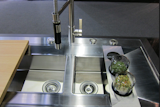7 Natural Cleaning Recipes You Can Whip Up in Minutes
Coming back to a spotless home is a relief, but the cleaning products we use can actually be irritants—many off-the-shelf products are a cocktail of synthetic chemicals, and with frequent and prolonged use, they can be harmful to our health and the environment.
Certain household cleaning sprays, for example, have been known to increase the risk of asthma, while more toxic products can irritate the eyes, cause allergies, or even chemical burns.
Avoid the nasty effects of synthetic chemicals by using one these all-natural, DIY solutions instead.
1. All-Purpose Cleaner
One of the simplest, natural, all-purpose cleaners that’s ideal for streaked windows, mirrors, and other surfaces, is a solution of vinegar and water. Mix one cup of vinegar with one cup of water, pour the liquid into a spritzer bottle, and begin cleaning. When cleaning marble, granite, or stone, replace the vinegar with vodka or rubbing alcohol.
2. Dishwashing Detergent
Stir two tablespoons of kosher salt into half a cup of warm, distilled water until it dissolves. In a separate bowl, combine half a cup of white vinegar, half a cup of Dr. Bronner’s Sal Suds, and one teaspoon of lemon juice. Add this mixture into the salt water solution, and stir until it’s thickened. Pour the mixture into a recycled dish liquid bottle, and use it as dish soap.
3. Oven Cleaner
A good, chemical-free way to clean your ovens is to fill a spritzer bottle with vinegar, and spray down the inside of your oven. Next, sprinkle baking soda over the vinegar-coated surfaces. Let the mixture set for a few minutes, or up to an hour for greasier ovens. Wearing rubber gloves, rub the inside of your oven with elbow grease, then scrub with steel wool, and use a damp cloth to wipe away the grease, stains, and grime.
4. Drain Unclogging
To get rid of gunk in your kitchen or bathroom drains, boil two cups of water. Pour half a cup of baking soda, then half a cup of vinegar, into the drains. Immediately after, pour the boiled water down the drain, and cover the opening with a pot or small saucepan to let the heat, baking power, and soda work to release the grime. Repeat as needed.
5. Grout Cleaner
6. Homemade Bleach
7. Air Purifier
If you’ve ever bought a canister of supermarket air purifier, only to open the windows because the scent was overwhelming, then you’ll appreciate a DIY air purifier that you can make with whatever scent you like. Pour some water and vodka into a spray bottle, then add your favorite aromatherapy oils, shake up the solution—and voila, you have your very own custom-made fragrance that can perfume your home.
Published
Last Updated
Topics
How-To & GuidesGet the Dwell Newsletter
Be the first to see our latest home tours, design news, and more.







